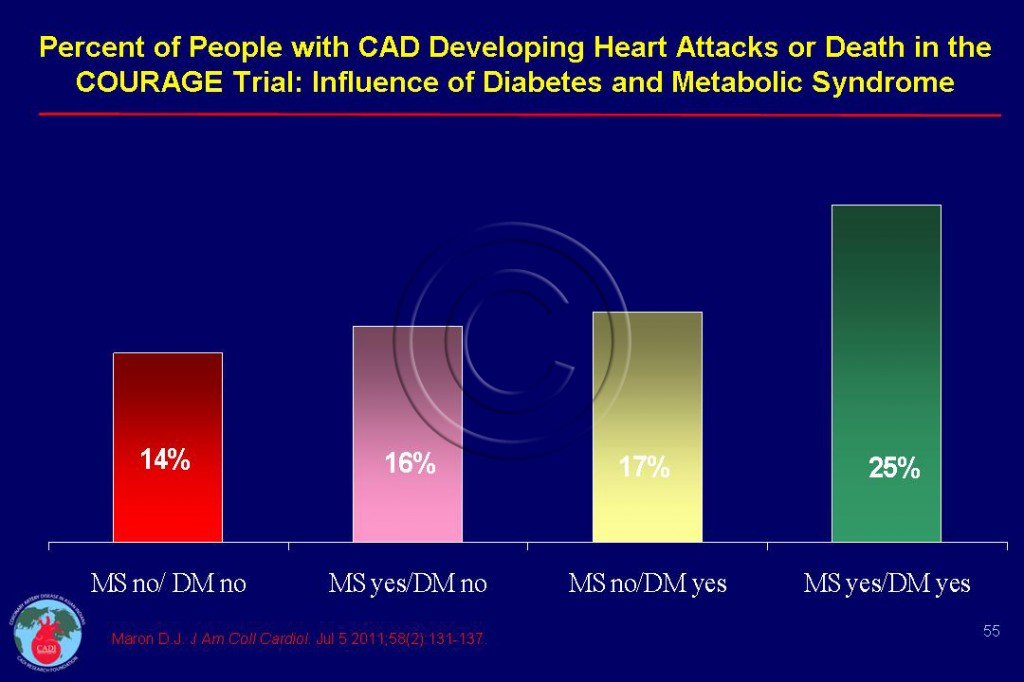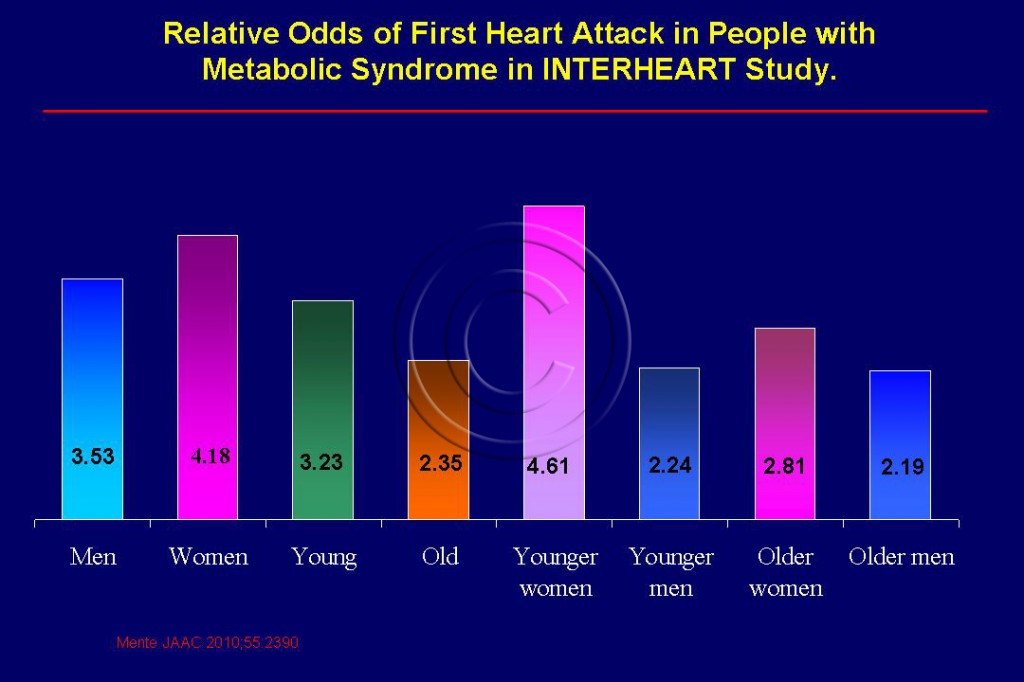Metabolic Syndrome and Heart Disease
- People with metabolic syndrome (MS) have a 2-fold risk of heart disease and heart attack (3-fold risk in women) compared to people without this condition.1-4 The risk of heart disease in people with MS is almost as high as those with diabetes and those who have both carry an exceptionally poor prognosis.1, 5
- MS is a major determinant of presence and severity of clinical and subclinical inflammation, coronary atherosclerosis, acute coronary syndrome (ACS) and left ventricular dysfunction, heart failure and its complications.6-12
- Presence of MS generally predicts unstable lipid-rich vulnerable plaques and death from premature CAD.13-15 Accelerated disease progression is often observed in the setting of MS.16
- MS is highly associated with ACS in young subjects (<45 years of age) and seems to be more valuable than established cardiovascular risk calculators.17 It appears that a high proportion of young Indians with ACS may have MS and deserve more studies.
- Prevalence of MS is 50% to 60% in people with ACS and as high as 80% in women.18 MS confers a poor in-hospital and long-term prognosis such as recurrent ischemia, heart failure and recurrent major acute coronary events (MACE) and death independent of the presence of diabetes.19-24
- The rate of coronary angioplasty, stent and bypass surgery (CARP) is almost double in people with MS and carries a poor prognosis.25 The risk is markedly increased in those who have diabetes in addition to MS.26, 27
- MS was associated with a higher prevalence and severity of left ventricular diastolic dysfunction (LVDD), which is further aggravated in people with concomitant diabetes. Such patients should receive appropriate medical care to prevent early heart failure.28
- Among men age 45 years and older and women 55 years and older, the MS confers moderately high risk of CAD (10-year risk of 10%-20%) and therefore requires lower, stricter LDL cholesterol targets (<70 mg/dl) especially among Asian Indians.29
- MS is an independent determinant of angiographically significant CAD, particularly among those individuals at low 10-year risk for future coronary events.30
- The risk of CAD among Asian Indians with MS appears to be similar or higher, compared to whites regardless of the criteria used including SAM-NCEP criteria.31-34
- In the COURAGE trial of patients with coronary artery disease (CAD) who received the state of the art medical therapy, MS was a predictor of heightened risk of recurrent events. The risk of death or recurrent heart attack was not much different for people with diabetes or MS but was double among those who had both despite intensive medical therapy and maximum modification of lifestyle (Figure 055).5
- The MS often coexist with chronic kidney disease, microalbuminuria and CAD.35
- The CAD risk associated with MS is substantially lower among those who are physically active.36 Thus physical activity not only prevents the development of diabetes but also reduces the risk of people with this condition.
- MetS confer greater risk of CAD in women particularly younger women and appears to be a crucial factor in the high risk of heart disease in non-smoking pre-menopausal Indian women. (see Figure 109)
Sources
1. Mente A, Yusuf S, Islam S, et al. Metabolic syndrome and risk of acute myocardial infarction a case-control study of 26,903 subjects from 52 countries. J Am Coll Cardiol. May 25 2010;55(21):2390-2398.
2. Mozumdar A, Liguori G. Persistent Increase of Prevalence of Metabolic Syndrome Among US adults: NHANES III to NHANES 1999-2006. Diabetes Care. Oct 1 2010.
3. Cheung BM, Ong KL, Man YB, Wong LY, Lau CP, Lam KS. Prevalence of the metabolic syndrome in the United States National Health and Nutrition Examination Survey 1999-2002 according to different defining criteria. Journal of clinical hypertension (Greenwich, Conn. Aug 2006;8(8):562-570.
4. Li M, McCulloch B, McDermott R. Metabolic Syndrome and Incident Coronary Heart Disease in Australian Indigenous Populations. Obesity (Silver Spring). Jun 9 2011.
5. Maron D.J, Boden WE, Spertus JA, et al. Impact of Metabolic Syndrome and Diabetes on Prognosis and Outcomes With Early Percutaneous Coronary Intervention in the COURAGE (Clinical Outcomes Utilizing Revascularization and Aggressive Drug Evaluation) Trial. J Am Coll Cardiol. Jul 5 2011;58(2):131-137.
6. Roberts AW, Clark AL, Witte KK. Review article: Left ventricular dysfunction and heart failure in metabolic syndrome and diabetes without overt coronary artery disease–do we need to screen our patients? Diab Vasc Dis Res. Jul 2009;6(3):153-163.
7. Narla V, Santos RD, Campbell CY, et al. Coronary artery calcification and inflammation according to various metabolic syndrome definitions. J Cardiometab Syndr. Winter 2009;4(1):33-39.
8. Ibebuogu UN, Ahmadi N, Hajsadeghi F, et al. Measures of coronary artery calcification and association with the metabolic syndrome and diabetes. J Cardiometab Syndr. Winter 2009;4(1):6-11.
9. Solymoss BC, Bourassa MG, Marcil M, Levesque S, Varga S, Campeau L. Long-term rates of cardiovascular events in patients with the metabolic syndrome according to severity of coronary-angiographic alterations. Coron Artery Dis. Jan 2009;20(1):1-8.
10. Yavuz B, Kabakci G, Aksoy H, et al. Determining the relationship between metabolic syndrome score and angiographic severity of coronary artery disease. Int J Clin Pract. May 2008;62(5):717-722.
11. Chen Q, Liu Y, Yin Y, Huang W, Li G, Ke D. Relationship between metabolic syndrome (MS) and coronary heart disease (CHD) in an aged group. Arch Gerontol Geriatr. Jan-Feb 2008;46(1):107-115.
12.Kasai T, Miyauchi K, Kubota N, et al. The relationship between the metabolic syndrome defined by various criteria and the extent of coronary artery disease. Atherosclerosis. Apr 2008;197(2):944-950.
13. Gami A S, Witt BJ, Howard DE, et al. Metabolic syndrome and risk of incident cardiovascular events and death: a systematic review and meta-analysis of longitudinal studies. J Am Coll Cardiol. Jan 30 2007;49(4):403-414.
14. Amano T, Matsubara T, Uetani T, et al. Impact of metabolic syndrome on tissue characteristics of angiographically mild to moderate coronary lesions integrated backscatter intravascular ultrasound study. J Am Coll Cardiol. Mar 20 2007;49(11):1149-1156.
15. Iribarren C, Go AS, Husson G, et al. Metabolic syndrome and early-onset coronary artery disease: is the whole greater than its parts? J Am Coll Cardiol. Nov 7 2006;48(9):1800-1807.
16. Bayturan O, Tuzcu EM, Lavoie A, et al. The metabolic syndrome, its component risk factors, and progression of coronary atherosclerosis. Arch Intern Med. Mar 8 2010;170(5):478-484.
17. Kalantzi K, Korantzopoulos P, Tzimas P, Katsouras CS, Goudevenos JA, Milionis HJ. The relative value of metabolic syndrome and cardiovascular risk score estimates in premature acute coronary syndromes. Am Heart J. Mar 2008;155(3):534-540.
18. Jover A, Corbella E, Munoz A, et al. Prevalence of Metabolic Syndrome and its Components in Patients With Acute Coronary Syndrome. Rev Esp Cardiol. Jun 1 2011.
19. Al-Rasadi K, Sulaiman K, Panduranga P, Al-Zakwani I. Prevalence, characteristics, and in-hospital outcomes of metabolic syndrome among acute coronary syndrome patients from oman. Angiology. Jul 2011;62(5):381-389.
20. Al Suwaidi J, Zubaid M, El-Menyar AA, et al. Prevalence of the metabolic syndrome in patients with acute coronary syndrome in six middle eastern countries. J Clin Hypertens (Greenwich). Nov 2010;12(11):890-899.
21. Hu R, Ma CS, Nie SP, et al. [Metabolic syndrome may be better at predicting the prognosis of coronary artery disease than other traditional cardiovascular risk factors]. Zhonghua Yi Xue Za Zhi. Jun 8 2010;90(22):1537-1541.
22. Miller AM, Alcaraz Ruiz A, Borrayo Sanchez G, Almeida Gutierrez E, Vargas Guzman RM, Jauregui Aguilar R. Metabolic syndrome: clinical and angiographic impact on patients with acute coronary syndrome. Cir Cir. Mar-Apr 2010;78(2):113-120.
23. Wassink AM, van der Graaf Y, Olijhoek JK, Visseren FL. Metabolic syndrome and the risk of new vascular events and all-cause mortality in patients with coronary artery disease, cerebrovascular disease, peripheral arterial disease or abdominal aortic aneurysm. Eur Heart J. Jan 2008;29(2):213-223.
24. Dohi T, Miyauchi K, Kasai T, et al. Impact of metabolic syndrome on 10-year clinical outcomes among patients with acute coronary syndrome. Circ J. Aug 2009;73(8):1454-1458.
25. Callahan A, Amarenco P, Goldstein LB, et al. Risk of Stroke and Cardiovascular Events After Ischemic Stroke or Transient Ischemic Attack in Patients With Type 2 Diabetes or Metabolic Syndrome: Secondary Analysis of the Stroke Prevention by Aggressive Reduction in Cholesterol Levels (SPARCL) Trial. Arch Neurol. Jun 13 2011.
26. Foody JM, Ferdinand FD, Pearce GL, Lytle BW, Cosgrove DM, Sprecher DL. HDL cholesterol level predicts survival in men after coronary artery bypass graft surgery: 20-year experience from The Cleveland Clinic Foundation. Circulation. 2000;102(19 Suppl 3):III90-94.
27. Bianchi C, Penno G, Malloggi L, et al. Non-traditional markers of atherosclerosis potentiate the risk of coronary heart disease in patients with type 2 diabetes and metabolic syndrome. Nutr Metab Cardiovasc Dis. Jan 2008;18(1):31-38.
28. Dinh W, Lankisch M, Nickl W, et al. Metabolic syndrome with or without diabetes contributes to left ventricular diastolic dysfunction. Acta Cardiol. Apr 2011;66(2):167-174.
29. Lorenzo C, Williams K, Hunt KJ, Haffner SM. The National Cholesterol Education Program – Adult Treatment Panel III, International Diabetes Federation, and World Health Organization definitions of the metabolic syndrome as predictors of incident cardiovascular disease and diabetes. Diabetes Care. Jan 2007;30(1):8-13.
30. Konstantinou DM, Chatzizisis YS, Louridas GE, Giannoglou GD. Metabolic syndrome and angiographic coronary artery disease prevalence in association with the Framingham risk score. Metab Syndr Relat Disord. Jun 2010;8(3):201-208.
31. Lee J, Ma S, Heng D, et al. Should central obesity be an optional or essential component of the metabolic syndrome? Ischemic heart disease risk in the Singapore Cardiovascular Cohort Study. Diabetes Care. Feb 2007;30(2):343-347.
32. Tillin T, Forouhi N, Johnston DG, McKeigue PM, Chaturvedi N, Godsland IF. Metabolic syndrome and coronary heart disease in South Asians, African-Caribbeans and white Europeans: a UK population-based cross-sectional study. Diabetologia. Apr 2005;48(4):649-656.
33. Enas EA, Mohan V, Deepa M, Farooq S, Pazhoor S, Chennikkara H. The metabolic syndrome and dyslipidemia among Asian Indians: a population with high rates of diabetes and premature coronary artery disease. Journal of the cardiometabolic syndrome. Fall 2007;2(4):267-275.
34. McNeill AM, Rosamond WD, Girman CJ, et al. The metabolic syndrome and 11-year risk of incident cardiovascular disease in the atherosclerosis risk in communities study. Diabetes Care. Feb 2005;28(2):385-390.
35. Gobal F, Deshmukh A, Shah S, Mehta JL. Triad of metabolic syndrome, chronic kidney disease, and coronary heart disease with a focus on microalbuminuria death by overeating. J Am Coll Cardiol. Jun 7 2011;57(23):2303-2308.
36. Broekhuizen LN, Boekholdt SM, Arsenault BJ, et al. Physical activity, metabolic syndrome, and coronary risk: the EPIC-Norfolk prospective population study. Eur J Cardiovasc Prev Rehabil. Apr 2011;18(2):209-217.



